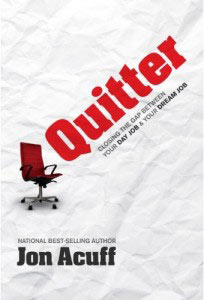 Books rarely start with a tutorial on how to remove your clothes in a bathroom stall. This book does. The trick apparently, is to start with your shirt. Doing a drop test on a door hook is an absolute must. Trying to balance something on the back of the toilet? Forget about it.
Books rarely start with a tutorial on how to remove your clothes in a bathroom stall. This book does. The trick apparently, is to start with your shirt. Doing a drop test on a door hook is an absolute must. Trying to balance something on the back of the toilet? Forget about it.
These words of wisdom let you know from that outset that this isn’t going to be like most other books. Jon Acuff was a serial quitter. He held eight jobs in eight years, moving from one to the other, hoping that the next job would be the ‘dream job.’ He wrote advertising and branding for companies such as Bose and Staples before finally landing at his dream job: joining the Dave Ramsey team to be a full-time author and speaker.
This book, written in his irreverent, satirical style, gives us an honest glimpse of how he moved from a day job to his dream job. The glimpse into his process, his journey, is an incredible encouragement (and instruction) for those who feel like they’re trapped in a job that is outside of their true calling and passion. In a potentially dry subject like work, Jon’s witticism comes to the rescue time and time again as his unique way of looking at life keeps the book refreshing and surprising.
If you read this book looking for a quick fix or a magic formula, you’ll walk away disappointed. There are no winning-the-lottery type lucky breaks in here, no leprechauns or unicorns. Just a bunch of hard work and ‘hustling.’ His first piece of advice to the dreamers who want to branch out and follow their passions: don’t quit your day job. Seemingly counterintuitive but incredible advice. When you quit your day job too early, you lock yourself into a prison of financial distress that actually makes it harder for you to pursue your passion. Although we’ve created a culture that celebrates the person who quits their job to follow their passion, that’s usually not the best course of action, at first.
The difference between the people who dream about a dream job and those that achieve their dream job comes down to one word: hustle. As Jon puts it, he felt like “hustle” was a better title for the book than “quitter,” but “hustle” had some negative connotations for those who worked the streets at night. So they went with “quitter.” Here’s what he says, “I don’t think any of the information in this book works without applying hustle to it. That’s the key. To this book and maybe even to your dream” (140).
Hustle is a catchy way to say “work hard.” Jon walks the reader through the normal excuses we use to keep our dreams our dreams and then destroys them. If we simply work hard, we’ll be able to achieve almost anything that we want. It comes down to discipline, hard choices, and lots and lots of work. “That’s one of the simple rules of hustle. Do more of the things you love and less of the things you like. Make your hustle matter” (150). Watching two hours of television a night isn’t something that matters in the long scheme of things, but it’s something most Americans do. If you replace something you like (t.v.) with something that you love (your passion/dream), then you’re hustling.
I appreciate this book because it speaks to a growing number of people who are out of love with their jobs. They don’t find any worth in what they do. They have a dream, a passion, but they don’t have the wherewithal to make that dream a reality. For the dreamers, many of them keep waiting for their dream job to drop out of the sky and fall into their laps, like winning the Mega Powerball of jobs. They want the dream, without the sweat and discipline required to see that dream come into reality. Quitter is a good blueprint to work from. Working your dream takes time, discipline, and more work than most people are willing to put into it. That’s what separates the dreamers from those actually living their dreams. Hustle.
LESSONS LEARNED
1. The principles from this book have been true in my life. I’m currently living my dream. I’m the pastor of a healthy, dynamic, growing church. I love the people I serve, and on most days, I think they love me too. It took me ten years to achieve my dream. I didn’t start out as pastor. I started out as the youth guy, serving in three churches as youth pastor over a period of ten years. I always wanted to be a pastor, but I knew I needed to ‘earn my stripes.’ I had to hustle. I had to prove myself faithful in my current ministry before being offered an opportunity to be a lead pastor. If I didn’t hustle over the past ten years, I wouldn’t be where I am today.
2. Most people are too lazy or undisciplined to see their dreams become reality. When my dad entered ministry three decades ago, he received an incredible piece of advice: “If you work hard, you’ll be ahead of 95% of the other pastors out there, because they’re lazy.” Sounds harsh, but it’s true. Not just for pastors, but for most people. It’s easy to dream. It’s hard to make that dream a reality. Too many people are distracted by secondary amusements. They settle, and sentence their dreams to ‘death by laziness.’
3. Hustle matters. One of the things that gave me a leg up when my current church called me to be a pastor was that I had finished my Doctorate in Ministry. I could have stopped with a Bachelor’s degree. I decided to keep pushing myself, completing a Master’s and ultimately a Doctorate. It was an incredible amount of work, but it paid off in helping me land my dream job. Hustle matters.
QUESTION: How has ‘hustle’ positively impacted your career?











